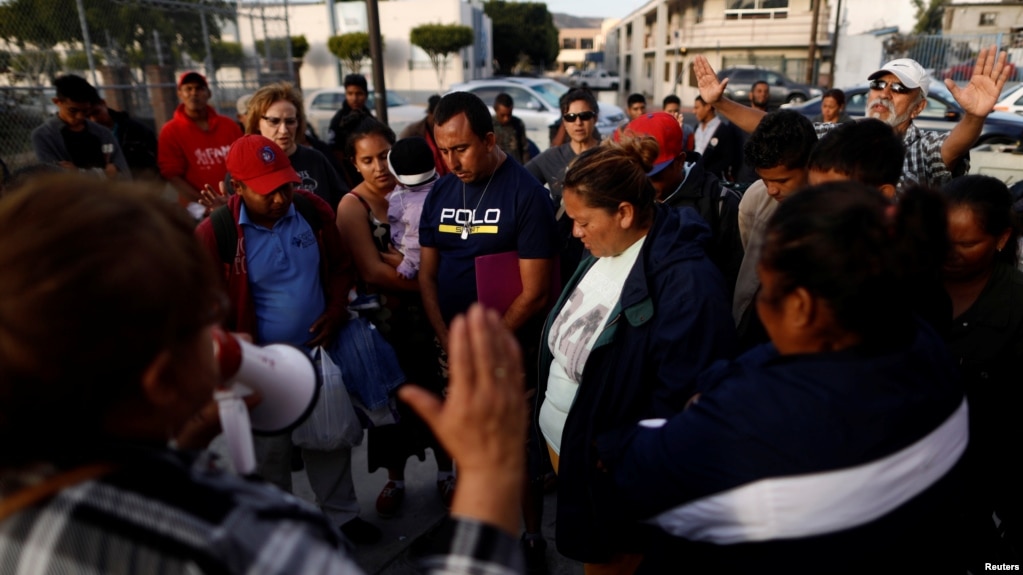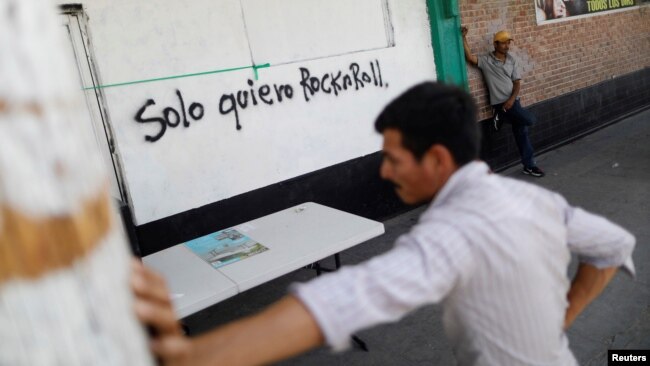April 29, 2018 3:06 AM

Members of a migrant caravan from Central America pray in preparation for an asylum request in the U.S., in Tijuana, Baja California state, Mexico, April 28, 2018.
TIJUANA, MEXICO —
Hondurans, Guatemalans and Salvadorans who drew the wrath of President Donald Trump in a monthlong caravan to the U.S. border will make hard decisions Sunday: Risk being deported all the way home by trying to cross in the U.S., or to build a life in Mexico.
After angry tweets from Trump, U.S. border authorities said some people associated with the caravan had been caught trying to slip through the fence, and encouraged the rest to hand themselves in to authorities.
“We are a very welcoming country but just like your own house, we expect everyone to enter through our front door, and answer questions honestly,” San Diego Chief Patrol Agent Rodney S. Scott said in a statement.

TIJUANA, MEXICO —
Hondurans, Guatemalans and Salvadorans who drew the wrath of President Donald Trump in a monthlong caravan to the U.S. border will make hard decisions Sunday: Risk being deported all the way home by trying to cross in the U.S., or to build a life in Mexico.
After angry tweets from Trump, U.S. border authorities said some people associated with the caravan had been caught trying to slip through the fence, and encouraged the rest to hand themselves in to authorities.
“We are a very welcoming country but just like your own house, we expect everyone to enter through our front door, and answer questions honestly,” San Diego Chief Patrol Agent Rodney S. Scott said in a statement.

Central American migrants, moving in a caravan through Mexico and traveling to request asylum in U.S, arrive in Mexicali, Baja California state, Mexico, April 25, 2018. The words read, "I just want Rock and Roll."
Sober advice, mood
Most of the group of about 400 travelers who arrived in border city of Tijuana on buses over the past couple of days said they intended to legally seek asylum in San Diego on Sunday, but lawyers advising the group gave them stark advice: Not everyone will be successful.
After the grueling journey, a somber mood took hold as the reality sank in that many of them would be separated from their families. Lovers and parents with slightly older sons and daughters could be forced to split up.
At venues around the city, U.S. immigration lawyers working pro bono Saturday listened to harrowing tales of life in the immigrants’ home countries.
Death threats from local gangs, the murder of family members, retaliatory rape, and political persecution back home prompted them to flee, the migrants and lawyers say.

Honduran family Nolvia Luja, left, Willian Bonilla, and their son Wilmer Bonilla, who attended the annual Migrants Stations of the Cross caravan for migrants' rights, rest at a shelter in Tlaquepaque, Jalisco state, Mexico, April 18, 2018.
Many of the immigrants who spoke at length with Reuters at various points during their trip through Mexico had been short on knowledge of their legal rights, but at least 24 recounted detailed stories of facing death threats.
As poor migrants from Central America on a perilous route through Mexico, they feared they could be robbed, raped, arrested and assaulted, so traveling by caravan offered their only protection, they said.
The lawyers advised which cases had higher chances of passing the “credible fear” test required to enter the long and often difficult U.S. asylum process, said immigrant rights organization Al Otro Lado, Spanish for On the Other Side.
“A lot will depend on how well they can articulate their case,” said one of the pro bono lawyers, who preferred to remain anonymous.
Some advised to stay in Mexico
The rest were advised to stay put in Mexico, which would remove the risk that U.S. authorities fly them the more than 2,000 miles (3,600 km) back home.
“We’ll wait and see,” said Bryan Garcia, from Honduras, seated beside 4-year-old Nicole, who was eating a strawberry biscuit as they waited for her mother to come out of a meeting with a lawyer.
Nicole and her mother are from El Salvador. They befriended Garcia along the caravan’s journey and the adults had fallen for each other.
But Garcia would not be asking for asylum. He would stay in Tijuana, having already been deported once from the U.S.
“We’ll just have to try to stay connected,” he said as Nicole paused from eating her biscuit and blinked up at him.
Pressure on Mexico
Trump has been pressuring Mexico to stop the migrants before they reached the border, linking the future of the North American Free Trade Agreement (NAFTA) to Mexican efforts to stem the flow of Central Americans.
The friction has coincided with high intensity efforts by U.S., Canadian and Mexican teams to renegotiate NAFTA on Trump’s bidding, with officials saying a deal could be just a few weeks away after months of talks.
Mexico deports tens of thousands of Central Americans every year back across its southern border with Guatemala.
No comments:
Post a Comment